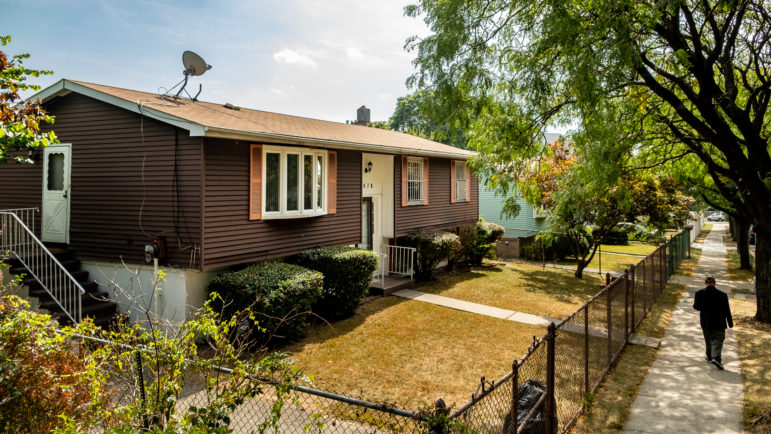Lawmakers say the COVID-19 pandemic and resulting unemployment makes this a time in which city homeowners may be particularly vulnerable to scams.

Adi Talwar
A single-family home in the Bronx.City Council members introduced legislation to combat deed theft during a joint committee hearing Tuesday afternoon—measures that would create an annual Sheriff’s report detailing deed theft-related data, and another that aims to make it easier for New Yorkers to seek help with or report an incident of fraud.
Additionally, Brooklyn Councilmember and Committee Chair of Housing and Buildings Robert Cornegy introduced three resolutions calling on the state government to implement a set of preventive measures for vulnerable homeowners. The first, Intro 1427-2020, asks the state to reform notary laws to better prevent housing fraud. Another resolution, Intro 1429-2020, asks the state to set more stringent standards for corporations’ with names that are too similar or mimic state or city agencies, or governments.
Cornegy’s third resolution calls for Gov. Andrew Cuomo to have Kings County, Brooklyn, declared a cease and desist zone—an effort to address aggressive real estate solicitation in a designated area by letting homeowners join a list of property owners that real estate companies are not allowed to solicit to sell. A community or neighborhood can apply for a cease and desist zone, and the New York Department of State holds hearings to see if the regulation is needed.
“With the COVID-19 pandemic and the resulting mass unemployment, many more homeowners will end up vulnerable to deed theft and deed fraud,” Cornegy said during the hearing.
Additionally, lawmakers introduced two other pieces of legislation to address the issue: the first, Int 1913-2020 by Councilmember Adrienne Adams, would require the city’s Sheriff to report document fraud complaints and investigations each year, broken down by borough and council district. The second, Int 1919-2020 introduced by Councilmember and Finance Committee Chair Daniel Dromm, would require the Department of Finance to provide information on how homeowners who fear they’ve been victims to deed theft or fraud can file a complaint or report it, and who they can contact for assistance.
Currently, homeowners can sign up for alerts with the DOF, which will notify them every time there’s a change in the system with their registered property, like if someone files a lien for unpaid debt.
City Sheriff Joseph Fucito said that over the past six years, his investigations have resulted in the arrest of 49 suspects tied to fraudulent property documents, with the total value of those properties in excess of $48 millions dollars.
But this year has brought on a special set of challenges for the housing fraud investigations. Due to the pandemic, courts and juries have been paused and so have interviews with witnesses, dragging the process out.
“In the present landscape, deed fraud is an onerous crime to investigate and the more hurdles we face the longer it takes to successfully complete an investigation,” said Fucito.
He said this year’s bail reform laws have also had an impact, in that it now “requires much more evidentiary documentation to be ready before the trial. This is not impossible, but it extends the time-frame considerably.”
Victims of residential real estate fraud in New York have largely been “the elderly, the financially disadvantaged, the medically infirm,” according to a 2018 State Supreme Court Grand Jury report, which outlined recommendations for the city and state to adopt as preventative measures.
Earlier this year, Attorney General Leticia James’ office launched the “Protect Our Homes” initiative to host information sessions with homeowners in Brooklyn, where over 40 percent of the complaints have been collected, according to Cornegy.









